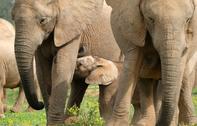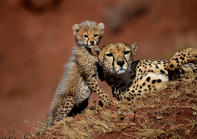World-class Wildlife Reserve
The Great Fish River, on which Kwandwe Private Game Reserve lies, was the focal point of decades-long hostilities during the early 19th century between the ruthlessly expanding British Empire and the realm of traditional Xhosa chieftainships.

The ruins of Fort Brown stand at the river crossing near the reserve, one of a line of British fortifications of that time that once defined the battlefront. The war these days in this Eastern Cape backwater is on preserving the last vestiges of a lifestyle that includes wild animals and land that has not been torn by plough and riven by pesticides or poverty.
So it was a brave campaign that was undertaken by Angus Sholto-Douglas, formerly a game ranger working in Botswana, and urged on by a wealthy American patron, to acquire 22,000 hectares of goat-infested valley bushveld and compacted agricultural lands, with the aim of restoring the area into a world-class wildlife reserve.
Settler Country

The wide-open spaces and tranquil scenery of today belie the area's turbulent history, which came to an apocalyptic end in the great Xhosa cattle killing tragedy of 1856, after which it became a forgotten corner of a neglected colony. Relics of the area's rich historical and cultural legacy can be still be found on the reserve and its surrounds, but it is the painstaking restoration of the area as a wildlife reserve that marks it for special consideration.
What makes the area unique in South Africa is that it is the meeting place of several major ecosystems and therefore offers a compelling palette of habitat diversity to utilise in recreating the natural domain. For the first time in over 200 years, you can see the Big Five wandering freely again in the valley of the Great Fish River in an area known as Settler Country.
There are many other species to be seen, but worth mentioning is that this is one of the surest places in South Africa to see cheetahs in the wild. A long list of conservation initiatives and ongoing research projects that sets Kwandwe aside as being markedly different from the typical private game reserve.
It is this aspect of the reserve that earmarks it as a prime example of responsible and sustainable tourism, rather than the operational greenness - or lack thereof. The next challenge for Kwandwe will be to implement those energy changes required to rank it among the top contenders on the list of Africa's finest.